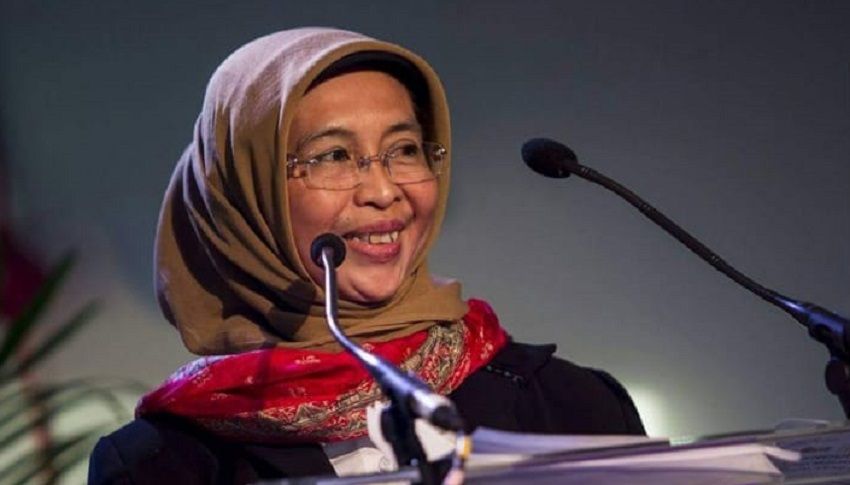Ahyani Raksanagara, Head of ICT Department, Bandung City Government, Indonesia
By Chia Jie Lin
Women in GovTech 2018 Special Report.

Bandung implemented a smart city approach at the end of 2013. We transform public services from manual to digital, to be more transparent, more efficient, and also very effective.
If citizens need services, they can use their smartphone. It's very efficient because we want our citizens to have more time for other activities. This is a transformation from our government, from the manual to digital, from high cost to efficient, from top-down to participatory, because people can also give suggestions. And the important thing is to be an open government: more transparent, and also from being “corrupt" to be a clean government by design.
Our responsibility is to build applications and infrastructure, and manage the data and security. I think it's a very wide responsibility, but it is all interesting because these elements interact with each other. We cannot choose one because when there is integration of systems, it's about the application, infrastructure, security and also about the data management.
What has been the most exciting thing that you worked on in 2018?
What is exciting for me is to integrate so many applications in Bandung City to transform from manual to digital. Our challenge this year is to integrate so many applications to one site. We have already finished the integration of the planning platform with budgeting, procurement and reporting. Now, we are moving towards licence integration. I think that is very exciting and for me, that is very challenging.
There are so many applications that we have profiled and innovated on in this year. The application for tax, for example. Now, the government referral system and emergency services are available online. This year, we provided more than 10 applications for the public service.
If you were to share one piece of advice that you learned in 2018, what would it be?
My former background is not IT; it is medical. I'm a medical doctor. The key for people who work in ICT is that first, they must be open-minded, have a lot of patience and dynamism, and want to work with the team, because I cannot do things by myself.
I'm thankful because my team is dynamic and has young people. Every time they have a problem, they are very open to ask and discuss. We have a system where we are very open to discuss and solve problems together. Don't talk too much about the problem; talk about how to solve the problem.
To build a smart city, it's not just only IT. IT is very important but don't forget to touch the people because they make the smart city complete - tech, and very smart and wise people. We have to improve it.
What tool or technique particularly interests you for 2019?
The most important thing is the Internet of Things to manage communications. Bandung uses IoT in some parts and we hope we can use for more systems. Because now we are more efficient and we have more time to think about innovation; we can have more time to give data-based services to the citizen.
What are your priorities for 2019?
One priority is to strengthen the regulation for e-government. Our priority is e-government because it's like the core of Bandung City. Our priority is e-governance. For 2019, we will give priority to improving e-government regulation, to improve the human resources and also to integrate all the applications and improve participation from the community.
We share open data with students and colleges for them to use the data for open innovation, to give a solution or a recommendation about our problem in Bandung City. This means we are open for participation to use the tech and data to give recommendations for our city. The open data initiative is on trial now.
In March or April, we will make an open data innovation programme together with Melbourne City. That is a very big step for Bandung City. Maybe some recommendations from another city is useful for our city, because maybe we have problems that they have already tackled.
On participation, we communicate with young people who build startups in Bandung City and we facilitate them to make bridges with businesses or government so they can improve the startups to be flexible.
What is one skill that has helped you the most throughout the course of your career?
My ability to hear and communicate, and my leadership skills. Leadership is very important because sometimes we must give the right direction to our team. My strengths are my leadership skills and communication.
What advancements do you predict will happen in your field in the next ten years?
We cannot be separate from technology. In the next 10 years, Indonesia will have a lot of cities that are going to become very smart. I'm very positive because the regulation has become more complete and the awareness of the leaders in the local government and national government is higher. There is already regulation from the Ministry of ICT and the President that the whole government must use technology and implement smart cities. So I think the regulation will be stronger and the tech infrastructure will be better.
Coffee, yoga, music… what powers you through your day?
My team and my family. My team is my energy because my team never gives up if they have a problem. There's always the positive thinking from my team. So that's the energy from my team.
Second is my family. They always support me in everything and give their appreciation to me.